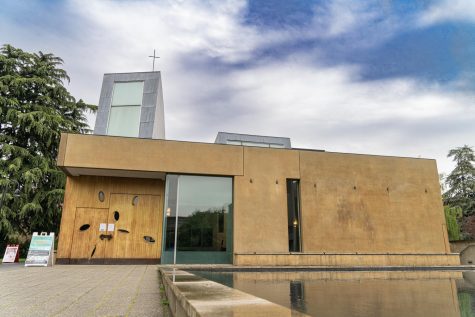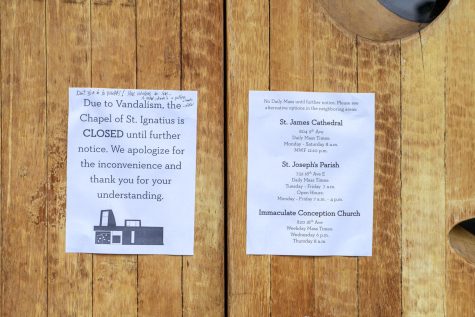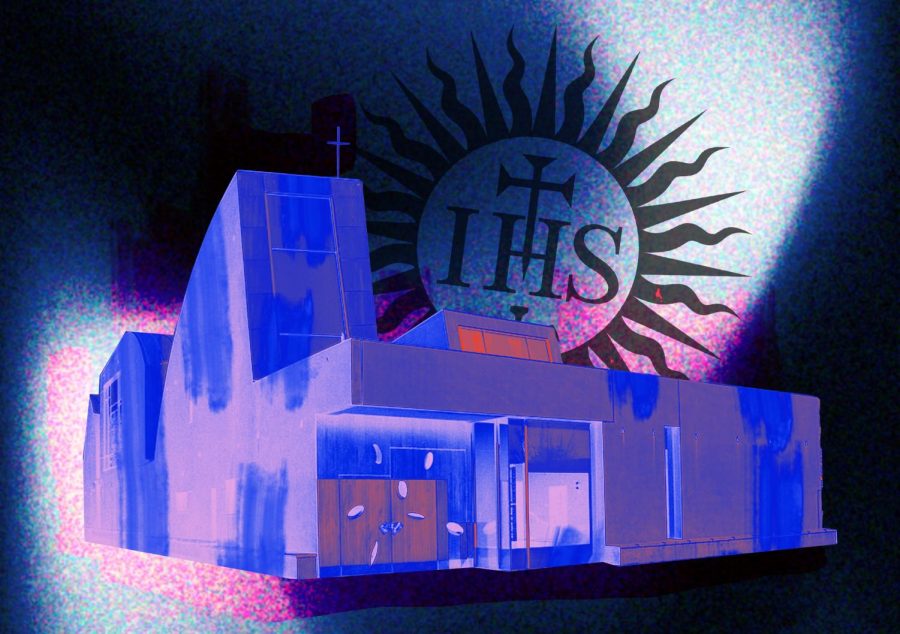Just a Tad Jesuit: Seattle U Faculty Contest Handbook Changes
In his 1973 address to alumni of Jesuit universities, Servant of God Pedro Arrupe remarked that the mission of Jesuit institutions “must be to form [people] for others…who will live not for themselves but for God and his Christ.” A group of Seattle University faculty aren’t so sure.
New Catholic Language
A proposed change to the Faculty Handbook would have inserted language into the code which reaffirmed the Catholic and Jesuit identity of the school:
“Jesuit and Catholic signify the distinctive and defining character of Seattle University. Recognition of the transcendent dimension of human life, as expressed in diverse religious and spiritual traditions, is fundamental to the identity of a Jesuit university. Seattle University faculty are a community of teacher-scholars with an acknowledgement of and a respect for Catholic religious, intellectual, and cultural traditions, while maintaining their individual faith commitment.”
The proposed language was a reuse of the Handbook’s phrasing before 2004. The current statement, which has been in use for nearly two decades, is less specific about the university’s Catholic tradition:
“As a community of teachers and scholars, the faculty acknowledges the University’s religious and cultural traditions and seeks, in a wide variety of ways, to contribute through the professional endeavors of its members to the Jesuit ethos. Seattle University faculty members respect the religious dimension of human life, which is a central element of Jesuit philosophy.”
The uproar from faculty regarding the additional Catholicity of the new language was swift and sustained at Academic Assembly meetings throughout the first week of May. The university relented. In a statement to faculty May 4, Academic Assembly President Frank Shih and Provost Shane Martin announced that the administration would not pursue the changes.
“We’ve taken the feedback under consideration and, in consultation with President [Eduardo] Peñalver and Vice President for Mission Integration Catherine Punsalan-Manlimos, we’ve decided to withdraw the proposed amendments on Jesuit and Catholic identity for this revision cycle,” Shih and Martin wrote.
The matter will be readdressed next academic year during the Mission Priority Examen, a process in which American Jesuit colleges assess their strengths and weaknesses as structures of the Catholic Church.
For now, the proposed changes have been put to a halt by faculty.

Mark Cohan, chair of the department of anthropology and sociology, stated that professors from across departments were concerned that the proposed language could decrease academic freedom.
“There’s something in this new language about respect for Jesuit Catholic traditions that concerns particularly faculty who do research in relation to Jesuit history of Catholic identity or anything that relates to theological concerns. There is some concern that this is a signal about less respect potentially for other traditions,” Cohan said.
While Cohan expressed concern that the now abandoned Catholic language would lead to a decrease in appreciation for other faiths, the majority of contesting faculty argued that Seattle U’s faculty body is primarily secular in character.
Kirsten Moana Thompson, the director of film studies, argued that the university’s identity is not primarily Jesuit or Catholic given that less than a quarter of the community is Catholic.
“A large portion of faculty and students are atheist and do not have faith commitments of any kind,” Thompson said. “We faculty disagree with aspects of the Catholic Church’s policy around abortion, patriarchal leadership of the Church and many other topics.”
Nalini Iyer, a professor of English, questioned whether the Handbook change could make it difficult to recruit BIPOC (Black, Indigenous, People of Color) and queer faculty.
“BIPOC faculty come from other faith traditions—some are Catholic, some are not. For LGBTQ faculty, I don’t have to tell you the difficulties, whether they are practicing Catholics or not, of being at a Jesuit Catholic institution,” Iyer said.
In the same week that faculty successfully lobbied to postpone any changes to the Faculty Handbook, the Chapel of St. Ignatius was vandalized. In a statement to the university community May 1, Peñalver detailed the extent of the sacrilege.
“Several items of furniture—as well as elements of the Chapel’s religious inscriptions—were defaced in the process. Seattle University Public Safety and the Seattle Police Department are actively investigating,” Peñalver wrote.
The chapel is now closed with the exception of the half hour period in which Mass occurs on weekdays. Because the daily liturgy is at 12:30 p.m., a small number of students are able to attend if they have to work or have an academic commitment. As of the publishing of this article, a student hoping to pray in a Catholic chapel or church in the evening would have to trek to St. James Cathedral.

It is not the first act of vandalism seeking to disrespect the university’s Catholic tradition. In November 2021, a vandal targeted the Arrupe Jesuit Residence in a series of vandalism attacks against Catholic buildings in the area.
Seattle U faculty members have expressed sadness about the vandalization, but stated that the vandalism should be understood as attacks on religious buildings broadly rather than a specific attempt at disrespecting a Catholic worship space.
“I would point out that this vandalism comes two weeks after the vandalism of a Jewish synagogue in the area where some of our faculty, administrators and staff are members,” Cohan said.
Joseph Nicholas DeFilippis of the department of social work feels that the university was forcing the Catholic tradition onto faculty members through the new Handbook regulations before their tabling.
“They’re cramming them down our throats,” DeFilippis said. “This language really runs counter to the university I thought I was working at when I came here eight years ago.”
While the Catholic social justice tradition and the Jesuits often apply gospel teachings in a manner which is construed by observers as politically progressive—such as advocacy for humane immigration policy, racial justice and environmental organizing—faculty coalesced around the notion that the Church is a uniformly conservative institution.
“Our existence as a ‘progressive Jesuit’ school is, to some, an oxymoronic articulation,” Thompson said.
Martin argued that the language can be changed to reflect the administration’s commitment to a vision of the faith which does not mean the disenfranchisement of marginalized groups and is reflective of the universality of the word Catholic.
“There’s been very helpful suggestions about what the statement gets right and what needs to be changed. In its current form, I don’t think it says what we want to say about Seattle University and our mission,” Martin said.
The provost envisions a future version affirming the university’s Jesuit and Catholic commitments while emphasizing the progressive lens through which Seattle U understands that identity. Whether such a statement is included in the Faculty Handbook is dependent on the Mission Priority Examen in the 2023-24 academic year.
While Seattle U’s faculty debate whether new language could implicitly signal less respect for other traditions, the Catholic community continues to grapple with limited chapel access following the defacement of their holy space.
New Anti-Disruption Language
While the conversation regarding the university’s Catholic identity remains stationary, the administration continues to deliberate the addition of language which would limit the right of professors to disrupt university functions while protesting:
“Responsible enjoyment and exercise of academic freedom and the rights listed in this Section II.A. include respect for academic freedom and the free exchange of ideas rights of other members of the University community. Infringement upon the academic freedom of others, or the disruption of University operations, programs, events or activities violate this principle.”
This language is reflected in proposed changes to the Student Code of Conduct and is pertinent considering the university’s history. In May 2016, a group of students with the support of some faculty staged a 24 day sit-in demanding curriculum changes in the Matteo Ricci College.
The demonstration was successful, leading to the reform of the college into the Matteo Ricci Institute and a university-wide reflection on decolonizing curriculum, including university events centering racial justice. The new language regarding disruption of university events has drawn faculty concerns that it could be used to crush student and faculty protests.
“I know some have asked us, ‘well what does disruption mean?’ And I don’t want to say that it’s intentionally vague, but you can’t come up with a policy that describes every situation. There’s no intention to assize faculty for expressing their appropriate first-amendment rights,” Martin said.
The provost argued that the language strengthens academic freedom and specifically condemned states attempting to regulate what professors are allowed to discuss in their classrooms.
Regardless of the university’s intentions in proposing the new language, union busting has already occurred at Seattle U. After adjunct professors attempted to unionize in 2014 with National Labor Relations Board (NLRB) approval, the university appealed the decision with the justification that a religious university should be protected from recognizing faculty unionization attempts. The NLRB sided with faculty, but by that point it was 2016, and the Trump presidency had begun. The administration promised they would appeal the issue all the way to the Supreme Court knowing that a conservative majority would be friendly to the university’s interests. Speaking to The Spectator following the folding of the union attempt in January 2018, Film Studies Professor Ben Stork argued that the climate was not conducive to a labor organizing victory.
“[Seattle U was] going to pursue the legal avenues until they either exhausted them or got the answer they wanted,” Stork said.
The underlying logic of busting the union was that faculty would give up if they knew that their attempt could codify an anti-union ruling in U.S. Supreme Court precedent. The unionization effort ended in 2018.
Peñalver argued that the new language would not be used to dissuade labor organizing or protests, but asserted that it was necessary to maintain the academic freedom of professors conducting classes.
“As a university, we welcome free speech and expression on our campus. But, as a university, we also need to ensure that one person’s speech does not violate the speech rights of others or interfere with our educational mission. This policy makes clear that freedom of speech on campus does not include the right to prevent others from speaking. Disrupting a campus event because of disagreement with the speaker or interfering with classroom instruction infringes on the free speech rights and academic freedom of the person who is silenced as well as the rights of those who would like to hear what the speaker has to say,” Peñalver wrote to The Spectator.
The Catholic Church, based upon Jesus’ constant commitment to the poor, has always been avidly pro-union. The Compendium of the Social Doctrine of the Church stresses the right to organize based upon the fundamental Catholic teaching of the dignity of all peoples, particularly the disenfranchised. There is no plausible interpretation of the union busting which occurred on Seattle U’s campus which is in accordance with the teachings of the Catholic Church. Peñalver, who was not at Seattle U when anti-labor actions occurred at the university, assures that no language in the Faculty Handbook blocks unionization attempts by non-tenured faculty.
Arrupe’s Vision
Pedro Arrupe’s dream for Jesuit institutions was one in which students and faculty, rooted in Christ, would advocate for human dignity under the direction of the gospel and traditions of the Church. At Seattle U, a rift has opened. On one side stands faculty who are consigned to a vision of an essentially secular campus with a chapel on the edge. On the other stands an administration that wants to make the school more Catholic but has a history of violating Church teaching regarding the dignity of the worker. Were Arrupe to step onto campus today, it doesn’t seem that he would find his vision on either side.



Paul Froehlich
Jun 17, 2023 at 10:09 am
As I assist my daughter with her college search, I recall being warned by the father of an alumnus about the culture at Seattle U. I thought I would keep an open mind, but this article and the editorial follow-up confirm what he told me. I don’t need a Catholic school to have 100% Catholic faculty like Christendom, but having respect for Catholic traditions –including respectful, constructive disagreement– shouldn’t be too much to ask of the students who attend there, and especially of the faculty employed there. Thank you to the Seattle Spectator for this coverage.
AJ Boyd
May 16, 2023 at 3:03 pm
“They’re cramming them down our throats,” DeFilippis said. “This language really runs counter to the university I thought I was working at when I came here eight years ago.”
One would expect any professor to at least do minimal research to discover that the university they’ve applied to is Catholic and Jesuit. Not exactly comforting to discover that this comes as a surprise to someone whose been there more than a couple days.
Annette Sansone
May 16, 2023 at 6:53 am
Excellent reporting on controversy between Catholic identity and secularism. Perhaps changing “respect” for Catholic roots/tradition to “acknowledging” them as foundation of SU is an acceptable compromise. As an alum of a formerly Catholic college which is today secular, I decry the trend while still valuing contribution of diverse faculty. Must admit, however, the assertion of atheism concerns me. Perhaps acceptable in a chemistry prof, not so much in more formative disciplines such as philosophy. If Catholic identity is lost, secular universities serve equally well for obtaining a degree. Formation of the person, however, is altogether different. I no longer can recite the Laws of Thermodynamics, but remain the person formed in the Catholic tradition 60 years ago.